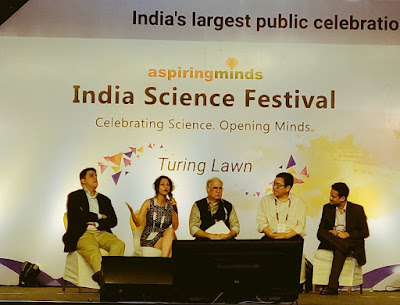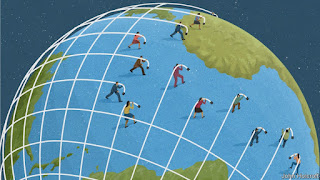Alan McSmith: Time to get in touch with your wild side
For every ten of those Mac worshiping, crackberry addicted, Starbucks weekend worker bees, there is always someone who makes noise of living simply, living deeply, living…period. Modern life is defined by this antithesis; the romanticism of nature rises as we get more technologically dependent and removed from the workings of the daily struggles for sustenance. We immerse in nature temporarily and dwell deeply in concrete worlds; we prefer to be unfamiliar with nature and familiar with the city, our daily landscape that we navigate through. But every once in a while we are called upon to pause, to pay attention, to reflect by physically and emotively experiencing the environment that nurtures us, with a hope that we will realize why it needs to be nurtured in turn. Alan McSmith, a nature guide who has worked for 25 years in the wilderness of Africa and an advocate for environment conservation, is one such soul.
His talk starts with the audience surrounding a digital campfire on the stage screen, transporting us to the dark and mysterious spaces of the Kalahari desert. We are taken on a journey through nature, as we put on our blindfolds and listen to his words:
...you feel the wind going through the trees
...you are out of your comfort zone
...a leopard is heard at a distance
...baboons
...the leopard and the baboons become your fear
...are you afraid of losing control?
...resist the temptation to lift the blindfold
...you feel the sunshine on your legs, your belly and eventually much to your relief, you feel the sunshine on your face
...you’ve done it!
The audience looks like they’ve come out of a hypnotic state, opening up to his message about nature as a way of life. He wryly remarks, “you by now have figured that my office is slightly different from yours,” and goes on to talk about how our connection with nature, regardless of where we live, will keep us rooted and stable. He has given each of the members a stone to hold onto, a humble reminder of the bigger picture, “whenever you feel threatened by a baboon in a boardroom for instance, the stone will bring you back to this point.”
McSmith hopes that we strive to create a balance, that of human innovation with humility towards nature. As we know, this is rarely looked at as a balance but rather competing principles as modernity has pushed us to make difficult decisions and we have often chosen the path of paying the price with nature. It seems like an inevitability that social development and the wilderness are in conflict. Yet what would happen if we felt this was not an option and that nature was a necessity for keeping our humanity, would we innovate differently? McSmith calls us to experience the simple living that the wilderness challenges us with, knowing that its often easier to hide behind the complex meanderings of the social web.
Remember the Walden Pond experience of the 1800s where Henry David Thoreau decided to live with and within nature to reclaim his humanity? “I went to the woods because I wished to live deliberately, to front only the essential facts of life, and see if I could not learn what it had to teach, and not, when I came to die, discover that I had not lived.” Naiveté to some, inspirational to many, we occasionally get a strong social voice that pushes us to explore what it means to get in touch with our wild side.
McSmith extends this tradition of seeking and thinking as he states, “wilderness is more than just a place, it is a way of life!”
CLICK HERE FOR THE VIDEO OF TALK ON TEDx AMSTERDAM website:






Comments
Post a Comment